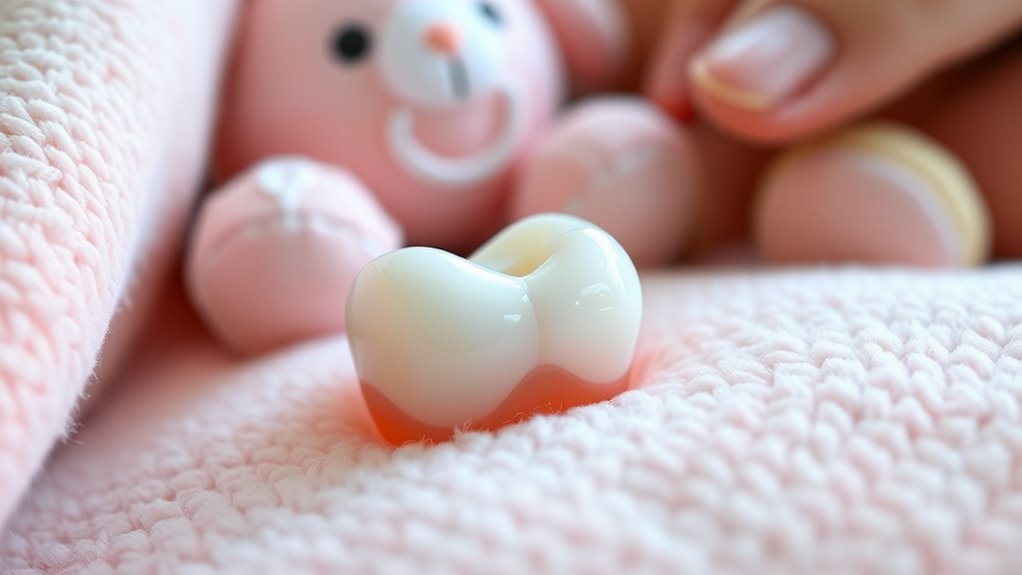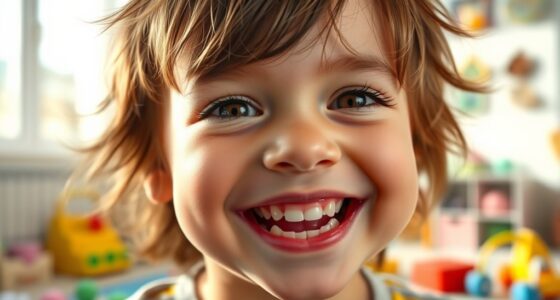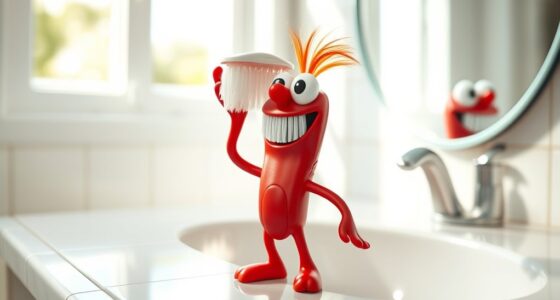The story of the first tooth is a joyful milestone that marks a child’s progress and innocence. It symbolizes growth, coordination, and the start of new skills like speaking and chewing. Families often celebrate this moment with traditions, stories, and pride, connecting it to cultural legends like the Tooth Fairy. These experiences boost your child’s confidence and help them understand their development. Keep exploring to learn more about how these moments shape childhood growth.
Key Takeaways
- The story of the first tooth often symbolizes a child’s growth, innocence, and milestones in childhood development.
- Cultural legends like the Tooth Fairy add magic and tradition to the experience of losing a first tooth.
- Celebrating the first tooth reinforces positive oral health habits and boosts the child’s confidence.
- Stories surrounding the first tooth highlight its significance as a sign of neurological and muscular coordination improvement.
- The tale emphasizes the joy and pride children feel during this important developmental milestone.
Exploring the Poem “The First Tooth” by Charles and Mary Lamb
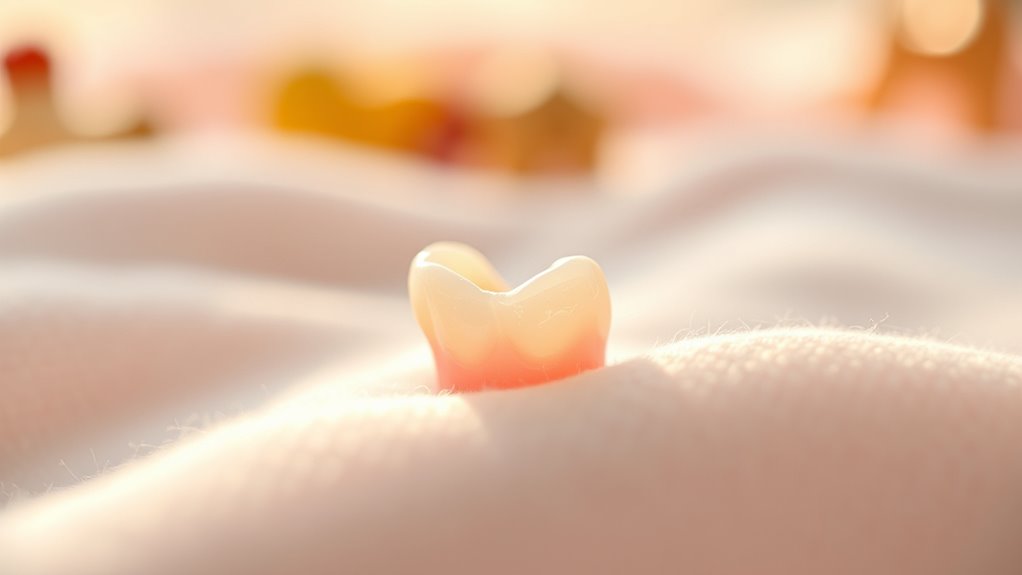
When you read “The First Tooth” by Charles and Mary Lamb, you sense a warm, conversational tone that captures the innocence of early childhood. The poem celebrates the pride a child feels when losing a tooth, a milestone many look forward to. You can imagine the child’s small, white tooth, and how it symbolizes growth and achievement. The poem hints at the Tooth Fairy’s role, as losing a tooth often brings thoughts of magic and reward. It highlights that even simple accomplishments, like saying a half word or trying to walk, matter deeply at this stage. The Lambs’ gentle language makes you feel connected to the child’s joy and pride, emphasizing the importance of these early milestones in childhood. Regular milestones such as losing a tooth can also be viewed as early childhood development, marking important phases of growth. Recognizing these moments helps in understanding childhood milestones and their significance in emotional and physical development.
The Significance of First Teeth in Childhood Development

Your child’s first tooth marks a key milestone, signaling growth and development. It also plays an essential role in speech and chewing skills, influencing their daily life. A well-aligned first tooth can also set the foundation for future dental health and proper projector calibration for optimal visual clarity. Additionally, understanding the horsepower of electric dirt bikes can be an interesting analogy for the power behind early dental development. Recognizing the importance of nutrient-rich foods can further support healthy teeth growth. Celebrating this moment can boost their confidence and highlight their overall progress.
Milestones and Growth
The appearance of a child’s first tooth around six months marks a pivotal milestone in their growth and development. This moment signifies progress in physical growth and marks the start of solid food intake, enhancing chewing abilities. Cybersecurity vulnerabilities can sometimes impact this developmental phase, highlighting the importance of a secure environment for children. As the first tooth emerges, it reflects improvements in neurological and muscular coordination, showing that children are beginning to explore oral sensations. Reaching this milestone also builds confidence and signals healthy development. By age three, most children have a full set of 20 primary teeth, illustrating steady physical growth. Recognizing these milestones helps you understand your child’s progress and encourages celebration. These early signs of growth are essential markers of overall development, setting the foundation for future health and abilities. Additionally, understanding key domains of development can help parents support their child’s overall progress during this exciting stage. Monitoring for symptoms of breast cancer in adults underscores the importance of awareness and early detection in maintaining health. Furthermore, advancements in AI technology are increasingly being integrated into healthcare, improving early diagnosis and treatment options.
Emotional Significance
The arrival of a child’s first tooth holds deep emotional significance, symbolizing a notable milestone in their growth. It marks progress in dental development and often sparks pride and excitement, making children feel accomplished. A new tooth can also serve as an early sign of digital literacy programs helping children develop confidence in new skills. Developing good oral health habits early can foster a lifetime of healthy teeth, reinforcing the importance of proper care from a young age. Additionally, the process of losing that first tooth can serve as an early lesson in emotional resilience, teaching children to adapt to changes and new experiences. Recognizing the psychological importance of this event can help caregivers support children through these developmental stages. The excitement surrounding this milestone often encourages children to take pride in their oral hygiene, setting the foundation for lifelong habits. Losing that first tooth can also boost their confidence and curiosity about growing up, reinforcing a sense of achievement. Cultural traditions like the Tooth Fairy or Tooth Mouse emphasize the emotional importance of this event, creating a magical moment for kids. These early milestones help foster positive attitudes toward oral health, encouraging good habits that last a lifetime. You’ll notice how this event nurtures feelings of pride, wonder, and curiosity, strengthening their emotional connection to growing up and caring for themselves.
Celebrating Early Milestones: Speech and Walking Achievements
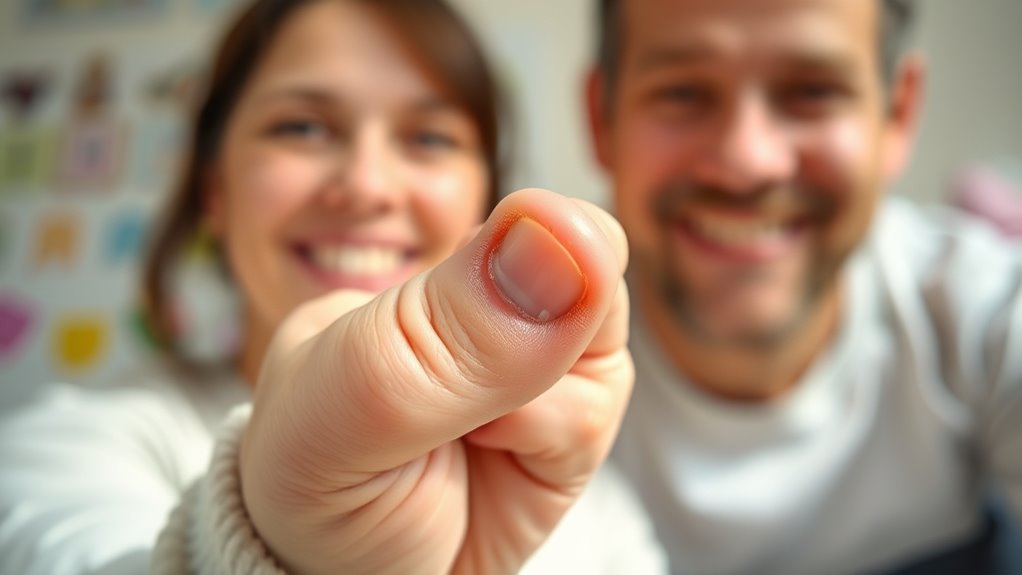
Celebrating early milestones like speech and walking achievements highlights how quickly children grow and develop. You’ll notice that even with limited speech, your child can say a single sound or half a word, showing progress in language. Watching them push with their foot while attempting to walk is a clear sign of emerging motor skills and coordination. These small accomplishments—like forming a basic word or mimicking walking—are important markers of growth. Engaging with early childhood development activities can further encourage these skills and boost confidence. You might feel proud as your child takes these first steps, both physically and verbally. While others may focus on the first tooth, these milestones reflect their ongoing development and increasing independence. Each step forward, no matter how small, is a celebration of their journey toward growing up. Recognizing these developmental milestones helps parents support their child’s progress effectively. Supporting their overall growth through a nurturing environment can also positively influence their emotional resilience.
The Innocence and Pride Reflected in Childhood Moments

You see how children take pride in the smallest victories, like losing a tooth or taking their first steps. Their innocence shines through in these simple moments, untainted by doubt or comparison. These childhood milestones remind us to celebrate genuine achievements, no matter how small, just as natural beauty in camping spots highlights the importance of appreciating simple pleasures in life. Recognizing personalized gifts that hold sentimental value mirrors the way children cherish their first milestones, emphasizing the significance of meaningful moments. Understanding how anime movies and animated films touch hearts can also deepen our appreciation for storytelling that captures genuine emotion and innocence.
Childhood Pride and Achievements
Childhood is a time when even the smallest achievements become moments of immense pride. You might remember how a tiny tooth falling out made you feel like a hero or how learning to say a half-word brought joy. These milestones, no matter how small, are treasured because they mark your growth.
Your first steps, your first words, and that loose tooth all symbolize progress and accomplishment. Developing fine motor skills through simple tasks like holding a spoon or threading beads is another important part of early achievement.
Celebrating small wins like trying to walk or speak, feeling proud of even modest progress, and valuing your own growth more than others’ perceptions are key. These moments reflect your innocence and genuine pride. They remind you that every step forward, no matter how tiny, is worth celebrating and builds your confidence. Childhood achievements shape how you see yourself and your potential.
Innocence in Early Growth
Have you ever noticed how a child’s face lights up over the smallest achievement? That shining smile reflects innocence and pure pride. When you see a child discover a tiny tooth, their joy is genuine, despite limited speech and motor skills. Their innocence shines through these moments, capturing the simplicity of early growth. The poem “The First Tooth” highlights this by focusing on such a small milestone, symbolizing innocence and wonder. These moments aren’t just about teeth; they show how children view their accomplishments as big achievements. Their pride, rooted in innocence, reminds us of the preciousness of childhood. Recognizing these milestones can also be an important growth indicator of a child’s development. Emphasizing these joyful experiences can also foster topical authority for parents and caregivers learning about early childhood milestones.
Celebrating Small Victories
The moment a child loses a tooth may seem small, but it’s a powerful reflection of innocence and pride. That tiny milestone shows how even the simplest achievements matter to children, boosting their confidence and sense of self. Celebrating these moments highlights their early successes, no matter how modest they seem. These victories, like losing a first tooth, help children develop a positive self-image and encourage them to appreciate their growth. When you acknowledge these small wins, you reinforce their feelings of pride and accomplishment. It’s not just about the tooth, but about nurturing their confidence and joy in their progress. Recognizing these milestones can also serve as impactful quotes that inspire resilience and reflection, emphasizing how even small steps contribute to personal development. Fostering confidence in early childhood sets a foundation for healthy self-esteem and encourages children to embrace future challenges. Their smiles light up with pride, showing how proud they feel. Sharing these moments makes children feel seen and celebrated. Celebrating small wins encourages a lifelong love of self-improvement, and understanding the significance of these moments in child development can deepen our appreciation of their growth.
Comparing Child’s Achievements to Peer Growth
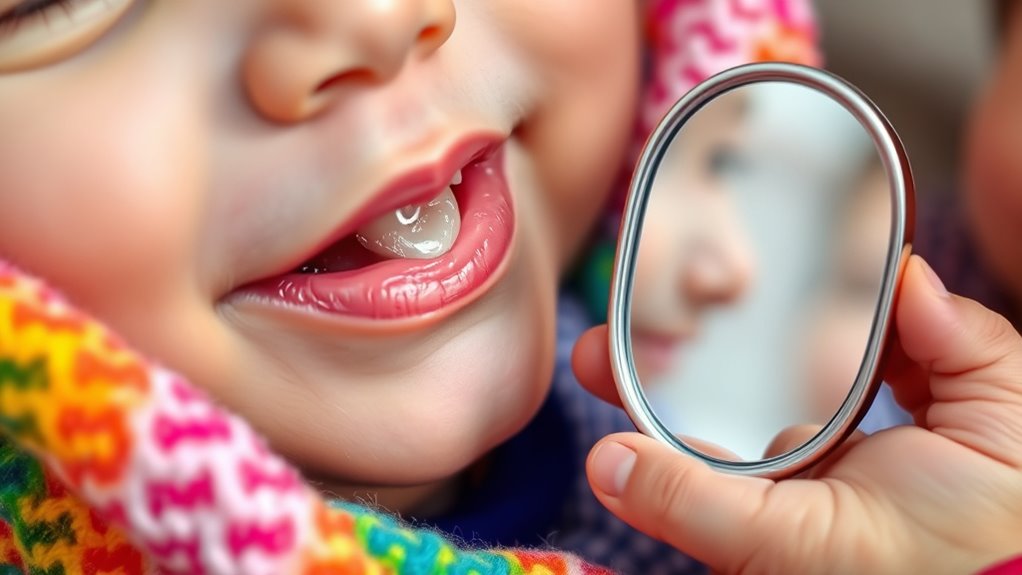
While a child’s first tooth may seem like a simple milestone, it often gets more attention than other developmental achievements, especially when compared to peers. You might notice that your child is proud of this early dental milestone, even if their speech is limited or walking hasn’t begun. Some children may speak only half a word, but they still celebrate their first tooth as a sign of progress.
A broader understanding of child development milestones can help parents recognize that each child progresses differently and at their own pace. Meanwhile, peers might be reaching more advanced goals, like full mobility or clearer speech, which can make your child’s accomplishments feel less significant. Yet, this focus on the first tooth emphasizes how early milestones are valued, often overshadowing the slow, steady growth happening in other areas. Recognizing that individual developmental timelines vary widely can foster patience and support for each child’s unique journey.
In addition, understanding child growth patterns can provide reassurance that variations are normal and expected. For example, recent advancements in machine learning algorithms contribute to more accurate assessments of developmental progress through data analysis. Comparing achievements highlights societal priorities, but each child’s development unfolds uniquely.
The Role of Play and Imitation in Motor Skills Development
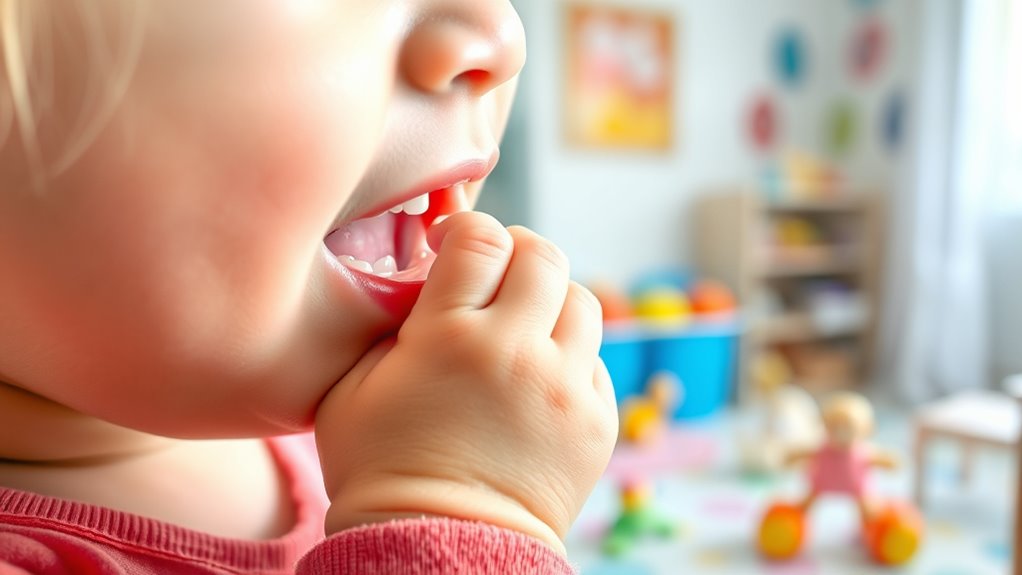
Play and imitation play an essential role in how children develop motor skills. When you watch your child push with their foot or mimic crawling, they’re practicing vital movements that build coordination and strength.
Imitation helps infants learn by copying actions like walking, which boosts neural pathways linked to movement. Engaging in playful activities encourages children to refine these skills, laying the foundation for independence.
Even simple actions, like pushing a foot or mimicking a crawl, are crucial steps in motor development. Through play, your child not only gains physical control but also gains confidence in their abilities.
This playful imitation nurtures their growth, helping them master essential movements that will serve as building blocks for future milestones. Motor skill development is further supported by the natural progression of children exploring their environment through play.
- Mimicking actions strengthens neural connections.
- Play encourages repeated practice for better coordination.
- Simple movements in play support overall physical growth.
How Childhood Pride Shapes Self-Perception
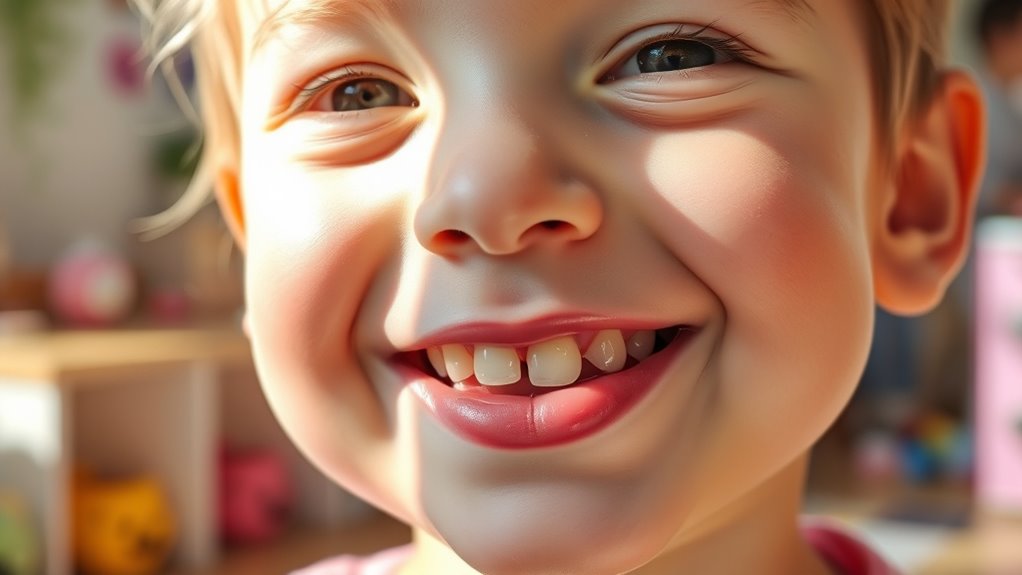
Have you ever noticed how proud children feel when they lose their first tooth? That moment boosts their self-esteem and signals growth. It shapes how they see themselves, reinforcing their sense of achievement. Celebrating milestones, like a first tooth, builds a positive self-image and encourages curiosity. Kids often compare their progress, whether in speech or walking, influencing how they view their abilities. These early successes create lasting memories that can boost confidence later in life.
| Childhood Milestone | Self-Perception Impact |
|---|---|
| Losing First Tooth | Boosts confidence, pride |
| Walking or Talking | Reinforces independence |
| Achieving Goals | Fosters a growth mindset |
| Celebrations | Strengthens self-worth |
Connecting Childhood Memories to Cultural Traditions
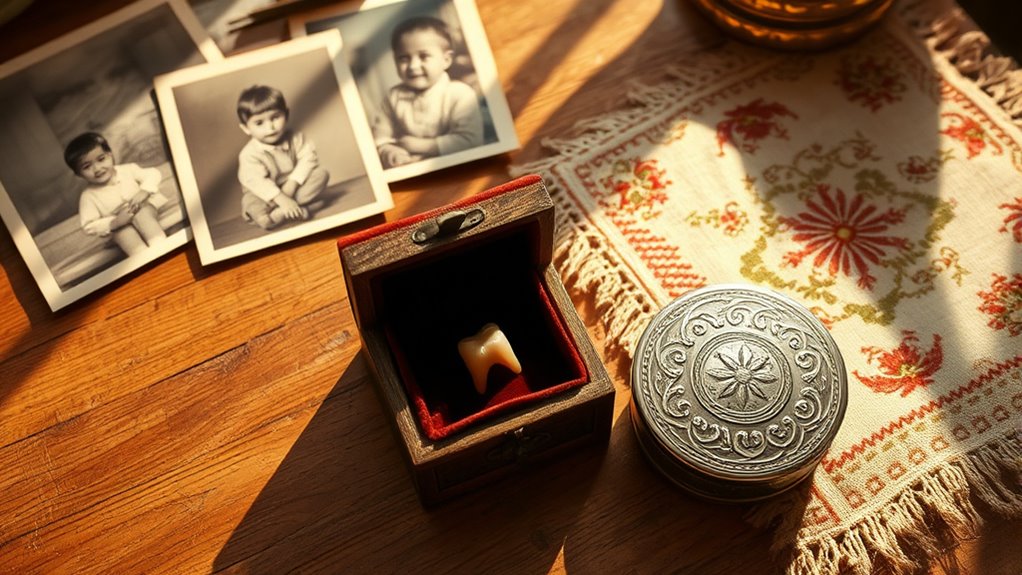
Childhood memories of losing a first tooth are deeply intertwined with cultural traditions that make this milestone special. These customs, like the Tooth Fairy in the U.S., the Tooth Mouse in Spain, or similar legends worldwide, turn a simple event into a cherished ritual.
Childhood tooth loss traditions make this milestone a cherished cultural and familial ritual.
You might recall leaving your tooth in water or under your pillow, avidly awaiting a small reward. Such traditions help children see losing a tooth as a positive step, symbolizing growth and new beginnings.
They also embed stories and folklore that make the experience memorable and meaningful. These customs connect you to your cultural roots and family history, creating stories to pass down through generations.
- Leaving teeth in water or under pillows for rewards
- Incorporating storytelling to celebrate the milestone
- Connecting childhood experiences with cultural legends
Frequently Asked Questions
What Is the Poem the First Tooth About?
The poem about the first tooth highlights your child’s pride in this small milestone. You see how it contrasts their early achievements like saying a half-word or trying to walk with others’ views of the tooth.
It captures the innocence and joy of childhood, emphasizing how these tiny moments matter deeply. You’re reminded that these milestones, though simple, symbolize growth and the proud steps your child takes in their developmental journey.
What Is the Real Story of the Tooth Fairy?
You might be surprised to learn that the modern Tooth Fairy tradition started in the early 1900s, evolving from European folklore where kids buried or burned their teeth for protection and luck.
Today, kids leave their teeth for a magical fairy who exchanges it for money, with the average payout around $6.23 per tooth in 2023.
This charming custom helps make losing teeth a fun and positive experience.
What Is the First Tooth Tradition?
You want to know about the first tooth custom. It’s a special milestone where children lose their baby teeth, often placing the tooth under their pillow.
In return, a fairy or similar figure leaves a small gift or money.
Historically, people buried or burned the tooth to protect against evil spirits.
Today, it’s a joyful event celebrating growth and shift from childhood to adolescence.
Is the Tooth Fairy Evil or Good?
You might wonder if the Tooth Fairy is evil or good—well, if you ask her, she’d probably say she’s just here for the charm and the cash.
In reality, she’s more like a whimsical, benevolent thief who sparks joy and encourages dental hygiene. Sure, her secretive nature might raise eyebrows, but she’s mostly a delightful tradition that makes losing teeth less terrifying and more fun.
Conclusion
As you look back on those early milestones, it’s like finding your first floppy disk—precious, nostalgic, and a glimpse into your growth. Celebrating your first tooth, walk, or word reminds you how innocence and pride shape who you become. Just as a vintage record player spins timeless tunes, your childhood memories echo traditions and moments that define your journey. Embrace these milestones—they’re your personal history, a classic story you’ll cherish forever.
